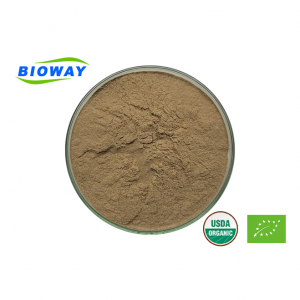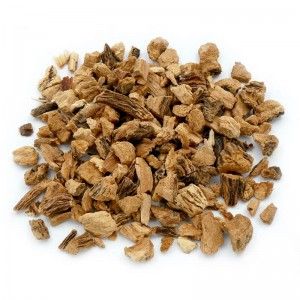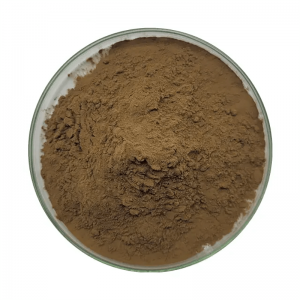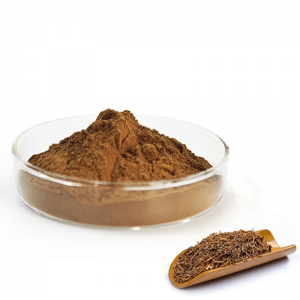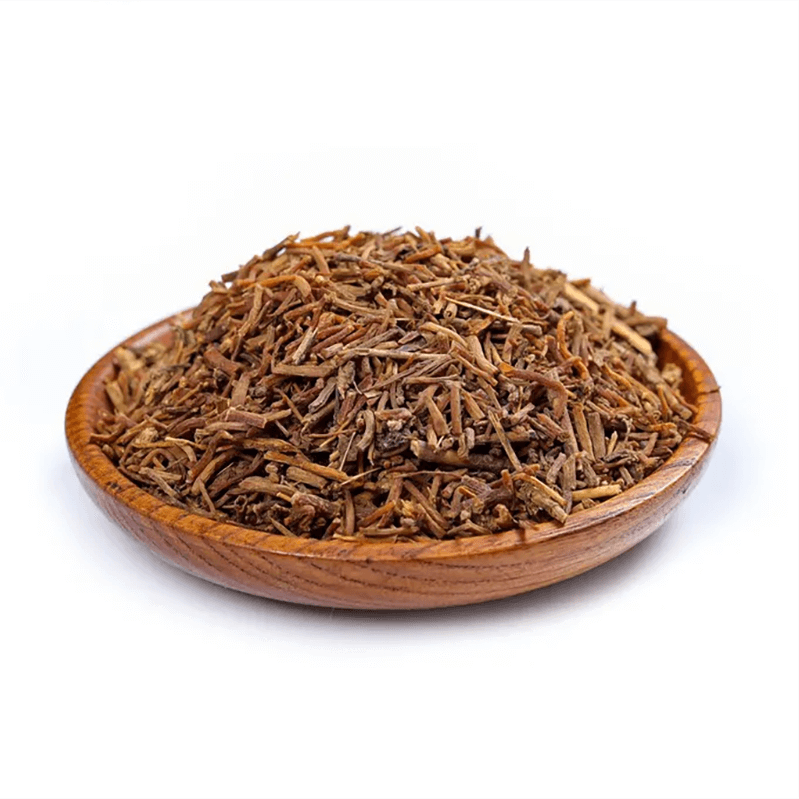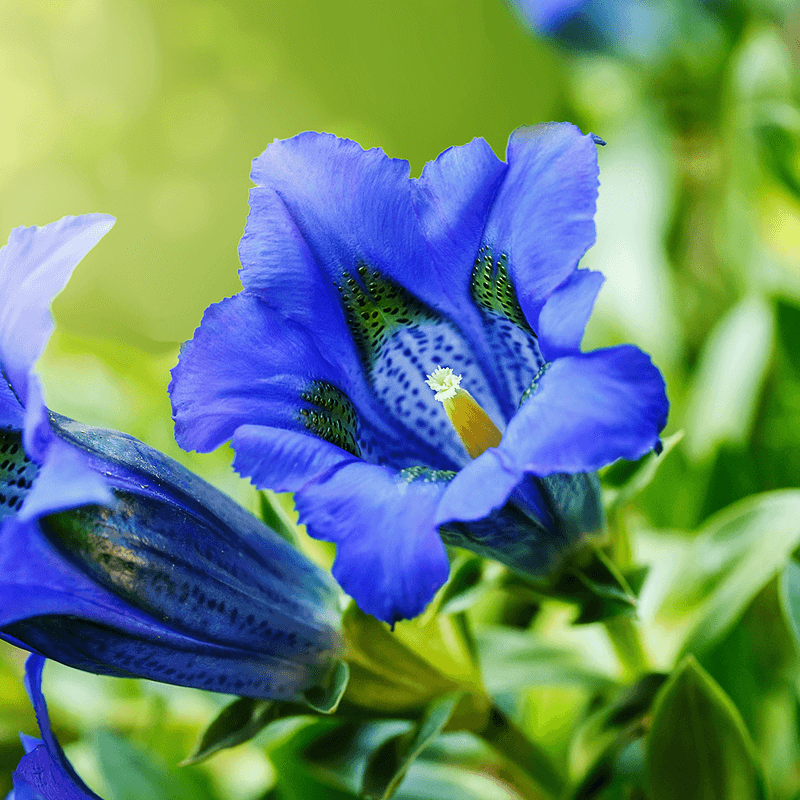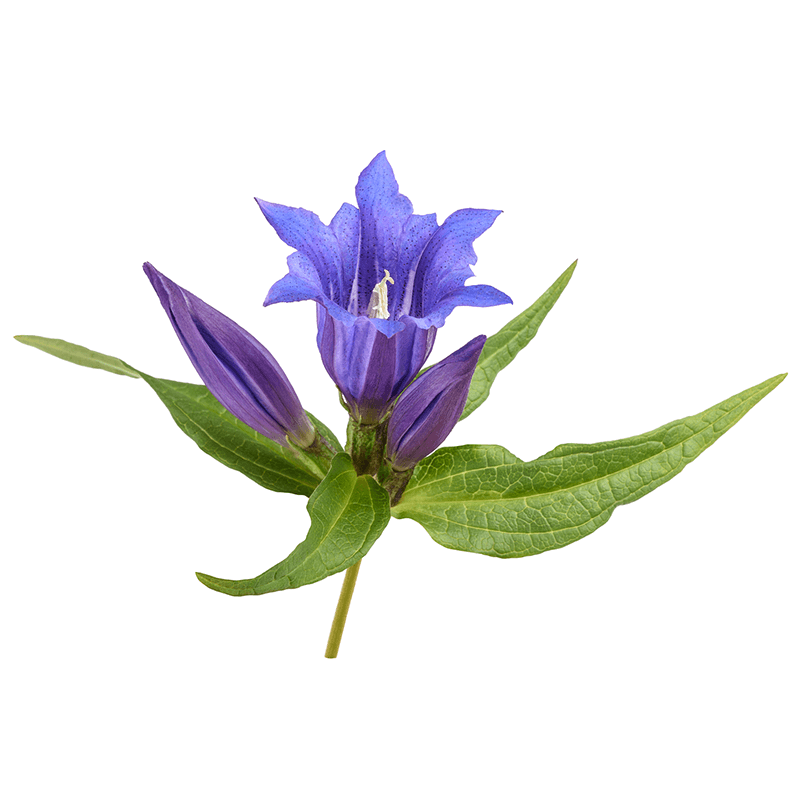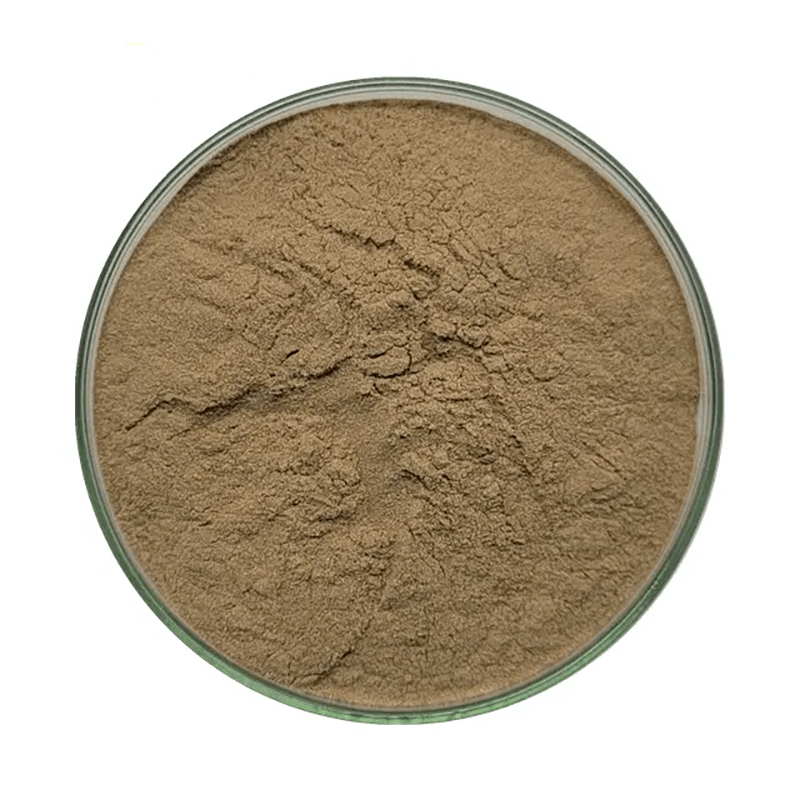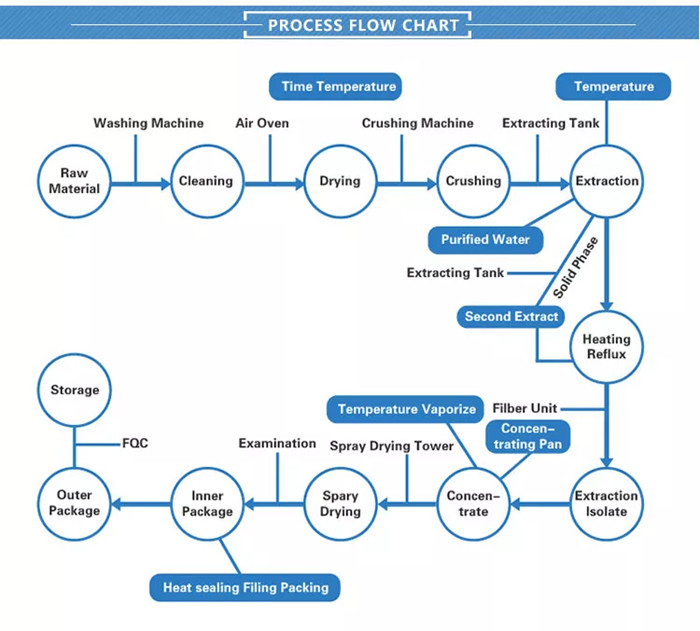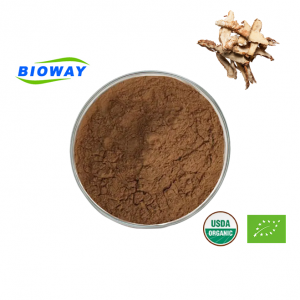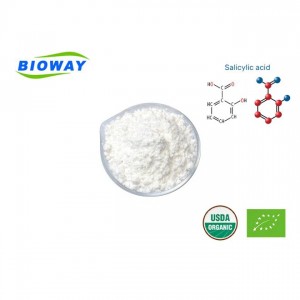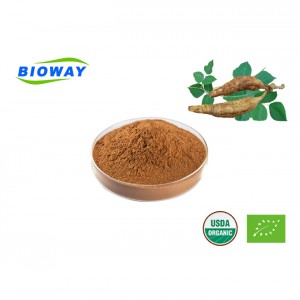Gentian Root Extract Powder
Gentian root extract powder is a powdered form of the root of the Gentiana lutea plant. Gentian is a herbaceous flowering plant native to Europe and is well-known for its bitter taste. The root is commonly used in traditional medicine and herbal remedies.
It is often used as a digestive aid due to its bitter compounds, which can stimulate the production of digestive enzymes and promote healthy digestion. It is believed to help improve appetite, relieve bloating, and ease indigestion.
Additionally, this powder is thought to have a tonic effect on the liver and gallbladder. It is said to support liver function and enhance the secretion of bile, which aids in digestion and the absorption of fats.
Moreover, gentian root extract powder is used in some traditional remedies for its potential anti-inflammatory, antimicrobial, and antioxidant properties. It is also believed to have benefits for the immune system and overall wellness.
Gentian root extract powder contains several active ingredients:
(1) Gentianin: This is a type of bitter compound found in gentian root that stimulates digestion and helps improve appetite.
(2) Secoiridoids: These compounds have anti-inflammatory and antioxidant properties and play a role in improving digestive function.
(3) Xanthones: These are potent antioxidants found in gentian root that help neutralize harmful free radicals in the body.
(4) Gentianose: This is a type of sugar found in gentian root that acts as a prebiotic, helping to support the growth and activity of beneficial bacteria in the gut.
(5) Essential oils: Gentian root extract powder contains certain essential oils, such as limonene, linalool, and beta-pinene, which contribute to its aromatic properties and potential health benefits.
| Product Name | Gentian Root Extract |
| Latin Name | Gentiana scabra Bunge |
| Batch Number | HK170702 |
| Item | Specification |
| Extract Ratio | 10:1 |
| Appearance & Color | Brown Yellow Fine Powder |
| Odor & Taste | Characteristic |
| Plant Part Used | Root |
| Extract Solvent | Water |
| Mesh Size | 95% Through 80 Mesh |
| Moisture | ≤5.0% |
| Ash Content | ≤5.0% |
(1) Gentian root extract powder is derived from the roots of the gentian plant.
(2) It is a fine, powdered form of the gentian root extract.
(3) The extract powder has a bitter taste, which is a characteristic of gentian root.
(4) It can be easily mixed or blended with other ingredients or products.
(5) It is available in varying concentrations and forms, such as standardized extracts or herbal supplements.
(6) Gentian root extract powder is often used in herbal medicine and natural remedies.
(7) It can be found in various forms, including capsules, tablets, or tinctures.
(8) The extract powder may be used in cosmetic products due to its potential skin-soothing properties.
(9) It should be stored in a cool, dry place to maintain its quality and shelf life.
(1) Gentian root extract powder can aid in digestion by stimulating the production of digestive enzymes.
(2) It may improve appetite and relieve bloating and indigestion.
(3) The extract powder has a tonic effect on the liver and gallbladder, supporting overall liver function and enhancing bile secretion.
(4) It has potential anti-inflammatory, antimicrobial, and antioxidant properties.
(5) Some traditional remedies use gentian root extract powder for immune support and overall wellness.
(1) Digestive Health: Gentian root extract powder is commonly used as a natural remedy to support digestion, improve appetite, and relieve symptoms of indigestion and heartburn.
(2) Traditional medicine: It has been used in traditional herbal medicine systems for centuries to promote overall wellness and treat ailments such as liver disorders, loss of appetite, and gastric issues.
(3) Herbal supplements: Gentian root extract powder is a popular ingredient in herbal supplements, providing its beneficial properties in a convenient form.
(4) Beverage industry: It is used in the production of bitters and digestive liqueurs due to its bitter taste and potential digestive benefits.
(5) Pharmaceutical applications: Gentian root extract powder is utilized in the pharmaceutical industry for its potential anti-inflammatory and antioxidant properties.
(6) Nutraceuticals: It is often included in nutraceutical products as a natural ingredient to support digestion and overall health.
(7) Cosmetics: Gentian root extract powder can be found in some cosmetic and skin care products, potentially providing antioxidant and anti-inflammatory benefits to the skin.
(8) Culinary uses: In some cuisines, gentian root extract powder is used as a flavoring agent for certain foods and beverages, adding a bitter and aromatic taste.
(1) Harvesting: Gentian roots are carefully harvested, typically in the late summer or early fall when the plants are a few years old and the roots have reached maturity.
(2) Cleaning and washing: The harvested roots are cleaned to remove any dirt or impurities and then washed thoroughly to ensure their cleanliness.
(3) Drying: The cleaned and washed gentian roots are dried using a controlled drying process, typically using low heat or air drying, to preserve the active compounds in the roots.
(4) Grinding and milling: The dried gentian roots are then ground or milled into a fine powder using specialized machinery.
(5) Extraction: The powdered gentian root is subjected to an extraction process using solvents such as water, alcohol, or a combination of both to extract the bioactive compounds from the roots.
(6) Filtration and purification: The extracted solution is then filtered to remove any solid particles and impurities, and further purification processes may be carried out to obtain a pure extract.
(7) Concentration: The extracted solution may undergo a concentration process to remove excess solvent, resulting in a more concentrated extract.
(8) Drying and powdering: The concentrated extract is then dried to remove residual moisture, resulting in a powder form. Additional milling may be performed to achieve the desired particle size.
(9) Quality control: The final gentian root extract powder undergoes rigorous quality control tests to ensure it meets the required standards for purity, potency, and absence of contaminants.
(10) Packaging and storage: The finished gentian root extract powder is packaged in suitable containers to protect it from moisture and light and is stored in a controlled environment to maintain its quality and shelf-life.
Storage: Keep in a cool, dry, and clean place, Protect from moisture and direct light.
Bulk Package: 25kg/drum.
Lead Time: 7 days after your order.
Shelf Life: 2 years.
Remark: Customized specifications also can be achieved.
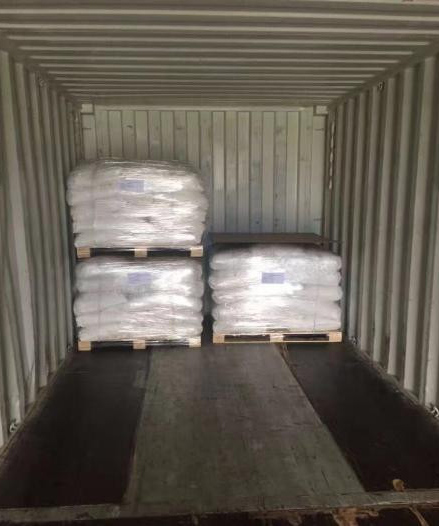
20kg/bag 500kg/pallet
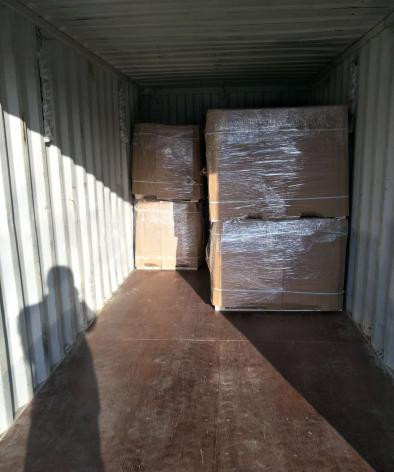
Reinforced packaging
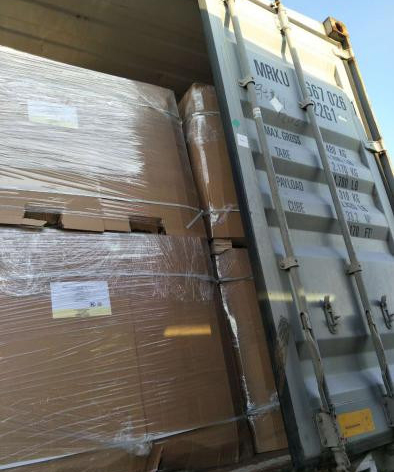
Logistics security
Express
Under 100kg, 3-5Days
Door to door service easy to pick up the goods
By Sea
Over300kg, Around 30 Days
Port to port service professional clearance broker needed
By Air
100kg-1000kg, 5-7Days
Airport to airport service professional clearance broker needed

Gentian Root Extract Powder is certified with the ISO certificate, HALAL certificate, and KOSHER certificate.

Gentian violet and gentian root work in different ways and have different uses.
Gentian violet, also known as crystal violet or methyl violet, is a synthetic dye derived from coal tar. It has been used for many years as an antiseptic and antifungal agent. Gentian violet has a deep purple color and is commonly used for external applications.
Gentian violet has antifungal properties and is often used to treat fungal infections of the skin and mucous membranes, such as oral thrush, vaginal yeast infections, and fungal diaper rash. It works by interfering with the growth and reproduction of the fungi causing the infection.
In addition to its antifungal properties, gentian violet also has antiseptic properties and can be used to clean wounds, cuts, and scrapes. It is sometimes used as a topical treatment for minor skin infections.
It is important to note that while gentian violet can be effective in treating fungal infections, it may cause staining of the skin, clothing, and other materials. It should be used under the supervision or recommendation of a healthcare professional.
Gentian root, on the other hand, refers to the dried roots of the Gentiana lutea plant. It is commonly used in traditional medicine as a bitter tonic, digestive stimulant, and appetite stimulant. The compounds present in gentian root, particularly the bitter compounds, can stimulate the production of digestive juices and improve digestion.
While both gentian violet and gentian root have their own unique uses and mechanisms of action, they are not interchangeable. It is important to use gentian violet as directed for treating fungal infections, and to consult with a healthcare professional before using any form of herbal supplement like gentian root.


